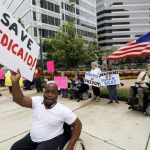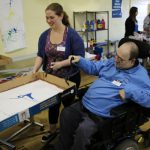
Posted on December 20, 2019
To go from her second-story bedroom to her second-story bathroom, Christine Hoag had to crawl. The bathroom doorframe was not wide enough for her wheelchair to fit through, the hall was too narrow for her chair to turn around and the bathroom itself was so cramped she could barely move between the tub and toilet.
“It felt like I had lost every shred of my dignity,” she says. She also, because of the crawling, had suffered multiple back injuries.
Hoag has Shy-Drager syndrome, a nervous system disorder with symptoms that resemble Parkinson’s disease. A related condition causes low blood pressure and tachycardia, which can produce lightheadedness and put her at risk of falling every time she transitions from sitting to standing. For a proudly independent entrepreneur who once founded her own home care company, the prospect of moving to a nursing home was not appealing. “I want to stay in my home,” she told me, and “have a nice quality of life as long as I’m here.”

Posted on January 10, 2019
You probably didn’t see them. Too few people did. News stories about thousands of people with disabilities facing life-or-death situations.
One reported that more than 10,000 people died waiting to hear the result of their Social Security Disability Insurance appeal in 2017. The other revealed that Delawareans with disabilities who rely on Supplemental Security Income can’t afford the rent on an average one-bedroom apartment.
Unfortunately, the stories appeared during the holiday rush. Bad timing. But you also likely didn’t see them because too few press outlets chose to give the topics the time of day. Then as now, the press was more interested in devoting space daily to Democrats taking control of the House, the government shutdown and the volatile stock market – important stories, surely, stories the media considers mainstream. Yet they also gave space, and plenty of it, to stories involving Meghan Markle and Lady Gaga, the weather, and, dare I say it and lose local readers of this post, the Eagles’ chances of making the playoffs.

Posted on December 10, 2018
With the midterm elections behind us, disability advocates face an opportunity to make significant legislative gains.
The conventional wisdom holds that gridlock will dominate the 116th U.S. Congress, which begins in January 2019. With a GOP majority in the Senate and a Democrat-controlled House of Representatives, both parties are poised to block each other’s most polarizing bills. But because there will likely be little movement on contentious agenda items, space will open up for other issues to come to the fore. The disability community is uniquely poised to take advantage.
Many disability-related policies were not only front and center in the midterm elections – several unified Democratic and Republican voters.

Posted on May 4, 2018
I can’t shake the memory of Artfest. Don’t want to, really. The creative workshop and community celebration that the Center for Disabilities Studies and Art Therapy Express hosted a couple Saturdays ago lasted just two hours, but the wall-to-wall smiles, the camaraderie, the incredible artwork left an indelible mark.
Opportunities for Artfest participants – individuals of all ages, backgrounds and types of disabilities – to express their artistic sides appeared endless, thanks in no small part to the encouragement they

Posted on October 27, 2016
I thought I understood the issue of employment for people with disabilities, until I watched Bottom Dollars, a new documentary from Rooted in Rights and filmmaker Jordan Melograna, which revealed to me how little I actually knew.
The film will likely have the same revelatory effect on you – should you attend a free showing of Bottom Dollars at UD’s Center for Disabilities Studies on Nov. 4 at noon. And don’t be surprised if the film spurs you to action,
This entry was posted in accessibility, authentic community integration, Center for Disability Studies, civil rights, community living, employment, inclusion, people with disabilities, public policy, sheltered workshops, subminimum wage, Uncategorized and tagged Bottom Dollars, Fair Labor Standards Act, Good WIll, individualized transition plans, Rooted in Rights, sheltered workshops, subminimum wage.






